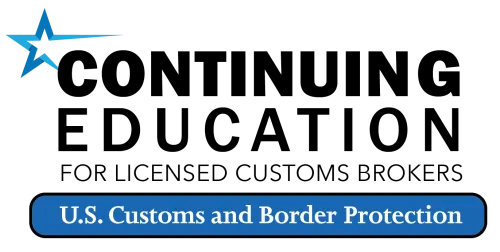Important!
To maintain an active license, individually licensed brokers must earn 20 CE credits from qualifying educational activities that occur beginning January 1, 2025 through January 31, 2027. January 31, 2027 is the end of the current triennial period.
General Information About the Continuing Education Requirement for Individually Licensed Customs Brokers
The Continuing Education (CE) program aims to ensure all CBP licensed brokers remain up to date on evolving customs rules and relevant U.S. trade laws to facilitate compliant trade in the modern environment, while acting as an additional layer of security against illegal trade from entering the U.S. commerce.
A variety of CE credit-eligible educational activities will be offered by CBP, partner government agencies, and private entities, including industry or trade-related conferences, seminars, webinars (both live and recorded), the Trade Summit and the Trade Forum, company trainings (internally developed or offered by an outside vendor), port tours and trade days sponsored by CBP and local associations.
Individual brokers who receive their broker’s license during a current triennial period will not need to comply with the rule until the start of the next Triennial Status Reporting period.
CBP partnered with five entities to develop and implement accreditation standards for the Customs Broker Continuing Education (CE) program for the private sector.
All accredited educational activities will present two visible signifiers: the logo of the accrediting entity and a unique CBP Continuing Education logo. There will also be a CE code displayed at the end of a CE activity.




